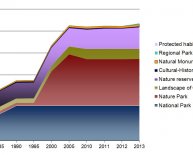
Economic development VS Environmental Protection
 The Economy Vs. The Environment:
The Economy Vs. The Environment:
Is There A Conflict? Executive Training
Program Presentation Mountain View Chamber of Commerce
The truth, of course, is that most of us care more about our standard of living than we do about the health of some species we seldom if ever see. And the truth, even harder to admit, is that most of us care more about our own welfare than we do about that of persons living three or four or five generations hence. If protecting the planet, for future generations and for other species, depended on changing these operational values, then we would be in deep trouble. And perhaps we are in deep trouble, but if we are, it is not because protecting the planet requires neglecting our own interests. Think whatever you wish about the moral standing of these operational values - this is the reality.
It is a deeply held view that protecting the environment constitutes a net expense to our economy. The popular wisdom these days is that environmental concerns have faded from the political radar screen because of the recession. Two years ago, with Earth Day 1990, all the polls showed that the public attached great value to protecting the environment. Today, not even the Democratic presidential candidates are declaring their intention to become "the environmental president."
To the extent that environmental concerns have faded in economic hard times, and they have, it is a reflection of the fact that most of the public and most of the leadership still believes that protecting the environment represents spending money rather than saving it, represents consumption rather than investment.
From this view, it follows that the task of public policy is to find the proper balance between the two. In a recession, the balance shifts to promoting economic prosperity and away from (quote) spending money (unquote) on the environment.
Reality Versus PerceptionEconomic activity, both production and consumption, relates to the environment in two fundamental ways - we draw resources (both renewable and non-renewable) from the environment to produce goods and services, and we emit wastes into the environment in the process of both producing and consuming.
Too often we think and act as if we were not part of nature. Rather than thinking of ourselves as nested in nature and dependent upon it, we think of ourselves as sitting on top of it, managing it. We think there is the human world and the natural world, and we forget that we are ourselves, with all our technology, part of nature.
So what is the reality? What will happen to our industrial civilization if the supply of natural resources is constantly diminished relative to demand? The answer is obvious. Our prosperity will be threatened. And the solution is obvious. We must strive to obtain more goods and services from our finite supply of non-renewable resources, and we must protect - from both extraction and waste impacts - the natural productivity of our forests, fisheries, agricultural and range land, and other renewable resources.
Yardsticks of ProsperityIts obvious that our continued prosperity depends on protecting both extractive potential and waste absorption capacity. In thinking about how environmental protection expenditures relate to future prosperity, we must first consider the yardsticks we use to measure how we are doing in economic terms.
Growth in gross national product has become the seminal indicator of the health of our economy. But how good a yardstick of our present or future prosperity is it?
Gross sales of goods and services as a measure leaves something to be desired. If an economic activity produces directly one million dollars in product but also results in one million dollars of costs in health impacts and destruction of essential assets, common sense might lead you to think nothing has been gained. But health services and asset replacement are part of the gross national product, and using GNP as a measure, the loss becomes a gain. To the one million dollars in product is added one million dollars in health services and asset replacement, yielding two million in GNP. Something is clearly wrong with this picture.
Lots of things which enhance our quality of life do not contribute to our GNP. For example, if we were to take extremely good care of our constructed assets - our homes, buildings, vehicles, industrial equipment and so on - we would spend less on their replacement. This would reduce our GNP, but can anyone reasonably suggest that it would reduce our wealth. GNP measures transactions, not net worth.
Beyond this, could anyone really suggest that human well being is adequately measured by net worth? If we maximize net worth, but poison our bodies in the process, would anyone really suggest that we would be better off?
Economic Impacts of Extraction &Waste Generation
As we look at our interest in the world, we think in sequence - individual, family, community, region, nation and world. Conventional economic thinking says that prosperity is a function of competitiveness, and that competitiveness is a function of efficiency. But when economists think of efficiency, they usually consider only the efficiency of labor and capital.
This is outmoded. Japan and Germany produce their products with about half the energy input of American industry. Energy represents about ten percent of the cost of production, and so they achieve with their efficiency about a five percent competitive advantage in world markets relative to US goods. This advantage is certainly significant, but to it must be added the price edge of using other natural resources more efficiently. These efficiencies benefit countries, companies, and local communities. Using our natural resource base in a more efficient way, and maintaining a larger supply of both non-renewable and renewable resources relative to demand, makes the products of a nation, a company, or a community more competitive in the marketplace.
At the same time, we must begin to calculate into our economic reasoning the costs imposed by wastes. When wastes reduce the productivity of natural systems - forests, fisheries, agricultural and range lands - they reduce our supply of economic inputs. When wastes damage our existing investments - acid rain eating our bridges, etc. - they reduce our wealth. And when wastes damage our health, they impose costs even as they add to GNP by generating demand for health services.
Rational Given Today's PricesWe can see that even given the prices of things today, environmental protection offers many substantial economic advantages. But a big piece of the puzzle has still been left out.
Today's prices in many cases make no economic sense. Price signals don't reflect the reality of the cost to provide goods and services.
When thinking about the operation of the market in metering the use of natural resources, we must realize the extent to which we subsidize resource use and thereby distort price signals.



















